Making History: Minkahyup
by Dae-Han Song
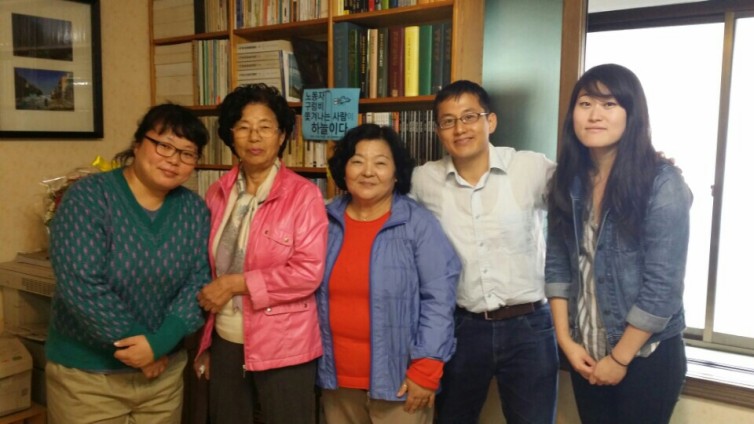
(from left to right) Kim, Hyun Joo; Kim, Jeong Sook; Jo, Soon Deok; Dae-Han Song; Stephanie Park; (camera-woman: Jeong Eun Hwang)
The interview was carried out by Dae-Han Song and Stephanie Park with interpretation by Jeong Eun Hwang.
On October 16th, Minkahyup had their thousandth Thursday protest against the National Security Law and for the release of all political prisoners. On October 22nd, Jeong-Eun Hwang[1], Stephanie Park[2], and Dae-Han Song[3] visited Minkahyup[4] to interview its current president Jo, Soon Deok[5]; former president Kim, Jeong Seok[6]; and administrative coordinator Kim, Hyun Joo[7].
“What was your reaction when you found out your sons were wanted by the police?” I start the interview. Jo, Soon Deok begins, “Mothers usually think, ‘The work [fighting for democracy] needs to be done, but why does it have to be my child?’ I felt the same.” A few months after becoming Student Council President, her son gave a five minute speech at a farmer’s rally in Yeoido Square and on the spot became a fugitive. “When a son or daughter becomes a fugitive the whole family becomes one too. The Gwanak police, the school police – they harass you at home, at work,” continues Jo, Soon Deok.
Both these women are of my mother’s generation. I wonder what my mother’s reaction would be given a similar situation. “You are both a little older than my mother. She is fairly conservative. Were the progressive politics always there or did they emerge from your work?”
Kim, Jeong Sook responds, “Your mother can’t but be conservative. She came from that time. Live as the government tells you to live; don’t do what they tell you not to do. Study hard; go work in a good company; make good money. Marry a good person; have children; live a good life. Those are the desires of a parent.” Her voice becomes tinged with emotion as she recalls the anxiety and distress of those times, “You don’t start coming out to the protests because you understand your child. You come because you are the parent, the mother. But as you come, as you listen to the stories and thoughts of others, you realize, ‘My son did right. How can we just live for ourselves? He is better than his parents: He wants to create a better world for everyone.’ When mothers realize this, they start to get even more active. It begins to matter less whether they ate or got roughed up by police that day.”
Their sons had both been incarcerated and/or been fugitives for a few years; yet Jo, Soon Deok’s Minkahyup activism spans nearly two decades and that of Kim, Jeong Sook’s over two decades. I ask what kept them committed. Kim, Jeong Sook responds, “At first people came out because their child was incarcerated. We came knowing nothing simply because the only people that could understand us and could comfort and console us were the veteran mothers who had experienced this. There was no other place. As we became the veteran mothers, we felt that same obligation towards mothers that were just starting.”
As Kim, Jeong Sook continues, it becomes clear that their work to free their sons became a gateway to a new understanding and engagement with the world. “At first, it was just about getting your child out of prison as soon as possible. And that was important, but we started to realize it was also about building a better world, about abolishing the National Security Law, and releasing the prisoners.”
Kim, Jeong Sook kept stealing glances at the clock. I find out she has to leave soon to pick up her grandson from school. Our interview focuses on her. As an activist, I ask the question I’ve posed to all the activists I’ve interviewed, “What was the hardest thing about the work? How did you overcome it?”
“Back then it was so repressive,” starts Kim, Jeong Sook. Her son became a fugitive in 1989. While the military dictatorship had technically ended with direct elections in 1987, the split in the opposition party allowed Roh Tae Woo, a military leader during the dictatorship, to win the election. “My son was a fugitive for just a year. During that time, he would show up at a press conference, make a statement, and then flee. So many cops were looking for him, that they used to say that if you didn’t have a picture of my son in your pocket, then you weren’t a cop.” Jo, Soon Deok chimes in, “Her son’s was a high profile case. He is the current deputy mayor of Seoul.” For Kim, Jeong Sook, not knowing when or how her son would be caught was her greatest anxiety. She recounts an instance when he fled by getting on a bus. When the bus stopped and the police rushed in, he jumped out the bus window and broke his leg. He was arrested on December 19, 1989 after someone tipped the police of his whereabouts.
She then pans out to the story of countless other mothers. “At that time, they would torture the prisoners. We worried our children were being tortured. When we went to see them, they would always say they weren’t being tortured.” She recounts the story of an overjoyed mother whose son told her he had not been tortured. Later during the trial, the mother fainted at hearing his testimony of torture. He had been tortured by electrocution, water drowning, and whisky bottle. Kim, Jeong Sook recounts the whisky bottle torture, “They would place the prisoner’s penis on the table and hit it with the whisky bottle yelling that he didn’t deserve to have children because he was a criminal. Then they would take turns drinking from the bottle. ” “Now, he’s an Assemblymember for the Democratic Party,” she adds. “I could spend days telling you all these stories.”
Our time is up; I ask her for any last words for readers abroad. “I would like to tell them to not forget what has happened in Korea. All the prisoners of conscience and their families that lived such difficult lives, I hope that they will not forget them and help support us and remember us,” she responds.
I pose the same question of difficult moments and overcoming them to Jo, Soon Deok. She mentions that the hardest time was not her personal experience but that of witnessing the distress of countless others as they ran around protesting in front of police stations and the Agency for National Security Planning (now the National Intelligence Service).
“In the beginning, we never thought we would have 1000 protests. But because political prisoners and social problems persist, we keep going. It would not have been possible to do the Thursday protests for 21 years without those around us – organizations and individuals – supporting us,” Jo Soon Deok responds.In reference to the previous week’s 1000th protest at Topgol Park, I asked how she felt about it. Many of the speakers that day had mentioned that while sad that the NSL and political prisoners had continued for so long, the protests were nonetheless a testament to the mothers who had persisted for so long.
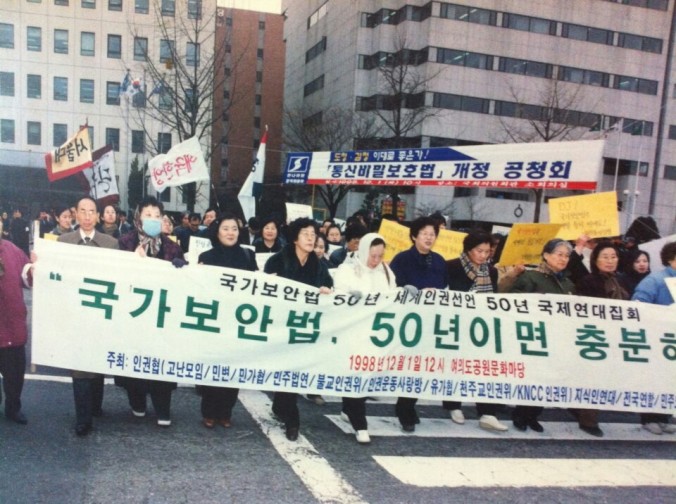
Jo, Soon Deok (third from the left) holding a banner calling for the abolishment of the NSL in its 50th year on December 1st, 1998.
The use of the National Security Law had peaked in 1996 with the Yonsei University Uprising. The Korean Confederation of Student Councils was labeled an enemy of the state, and many of its student activists became fugitives and were arrested under the NSL. When Kim Dae Jung came into office in 1998, the NSL persisted, but many of the accused were pardoned and the number of incarcerations under the NSL drastically dropped. Then in 2004, President Roh Moo Hyun stated he would put the NSL in a museum as it was outdated. This inspired massive mobilizations in civilWe move on to Minkahyup’s current demands. Kim, Hyun Joo the Administrative Coordinator answers, “Our demands are the release of all prisoners of conscience and the abolition of the National Security Law.” Minkahyup also engages in various struggles around democracy, prison conditions, and peace in the Korean Peninsula. All the issues are part of a struggle to build a better world. As one of the key organizations against the National Security Law, Kim, Hyun Joo gives us a brief overview of the National Security Law and the struggle against it. She recounts its origins from a Japanese Colonial law used to capture and oppress independence fighters. On December 1st, 1948, it became a Korean law under its current name. While we were talking, Jo, Soon Deok slipped out and came back with an old photo. Kim, Hyun Joo notices and mentions, “That’s a picture of our annual funeral for the National Security Law in December 1st, 1998.” Every December 1st, social movements gather to call for the abolition of the National Security Law, thus celebrating not its birth but future demise.
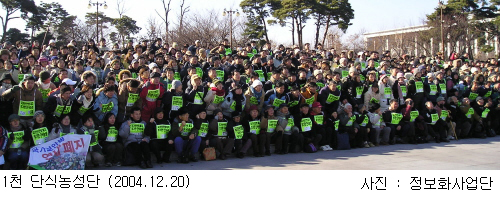
1000 protestors went on hunger strike in front of the National Assembly calling for the Abolition of the National Security Law (December 20, 2004)
Currently, the NSL discussion has been put on the back burner since 2004 because there were so many other struggles like the Ssanyong Auto Workers Struggle, or the Yongsan Eviction Tragedy. The NSL struggle never reached the peak it did in 2004. Minkahyup, Alliance to Abolish the National Security Law, Human Rights Groups, or the Korea Alliance of Progressive Movements – we keep holding protests every December 1st calling for the abolishment of the NSL.society to get the NSL abolished. A thousand people fasted for its abolishment in Yeoido Park (near the National Assembly). Yet, the growing protests and mobilizations sparked a backlash from conservative groups. Kim, Hyun Joo recalls, “The conservative groups argued, ‘If the NSL is abolished, how are you going to lock up a person that goes out to Yeoido waving the North Korean flag and yelling long live Kim Il Sung?’ My response is: ‘So what?’ When Obama comes to Korea, aren’t there people outside waving US flags and saying long live Obama? How is that any different?” Ultimately, the NSL failed to be abolished or even reformed. Nonetheless, it was rarely used under Roh Moo Hyun. It was only after the conservatives came back into power with Lee Myung Bak’s election that the NSL began to be used to investigate, prosecute, and convict people. It continues to be so used under the conservative Park Geun Hye administration.
Currently, conservative groups are trying to introduce legislation that would confiscate property and mete out harsher punishment against those that join organizations deemed enemies of the state. While individuals can be arrested, the NSL cannot disband these groups. So, other people can still join the organizations. So, the Saenuri Party introduced these types of legislation where property would be confiscated or there would be harsher punishment if you joined such illegal organizations. We have managed to keep this legislation from being introduced in the National Assembly.
I wonder at the survival of such vestige from Japanese colonialism and the Cold War, “What would it take for the NSL to be abolished?” Kim, Hyun Joo explains that the NSL is linked to inter-Korean relations. She elaborates, “When inter-Korean relations are better, when we view each other as partners in reunification and cooperation, then the National Security Law loses significance. Back when hundreds a day would visit Mount Geumgang – when exchange was very active – all of those were infractions of the NSL; yet, so many people were doing it, that the NSL dissipated from the hearts of people. But now when inter-Korean relations are bad, and the government has a policy of pressuring North Korea. We start to think, ‘If I say anything nice about the North Korean government, will I be violating the National Security Law? And so they self-censor.’ Roh Moo Hyun’s statement about abolishing the NSL in 2004 had only been possible because there had been a policy of engagement and reunification since Kim Dae Jung’s presidency because the Mount Geumgang tours were happening, because the exchange was very active. So the struggles for improving inter-Korean relations and for abolishment of the NSL are interconnected.
As we wind down our interview, Jo, Seong Deok has the last word, “I hope that the NSL is abolished, that there will no longer be any political prisoners, and that we no longer have to have the Thursday protests.”
‘Till that day.
[1] Jeong Eun Hwang is the ISC Communications Coordinator.
[2] Stephanie Park is an ISC intern.
[3] Dae-Han Song is the ISC Policy and Research Coordinator.
[4] Minkahyup was established in 1985 by families of political prisoners. In protest of President Kim Yong Sam’s statement that “there are no political prisoners in Korea,” they held their first Thursday protest in September 23, 1994 at Topgol Park. Since then, regardless of the bitter cold, scorching heat, and pounding rains, they have held their weekly Thursday meetings. On October 16th, they held their thousandth Thursday protest.
[5] Jo, Soon Deok has been Minkahyup[5] president since 2011. Previously, she served as president 2002-2005. She has been a member since 1996 when her son, a college student at the time, became a fugitive under the National Security Law. After two years as a fugitive, her son was pardoned when Kim, Dae Jung took office in 1998.
[6] Kim, Jeong Sook was Minkahyup president in 1992 and 1998. She has been a member since 1989 when her son, a college student at the time and now the deputy-Mayor of Seoul, became a fugitive under the National Security Law.
[7] Kim, Hyun Joo has been the Minkahyup administrative coordinator for 4 years. She joined the social movement as a university student upon witnessing students incarcerated for violating the National Security Law.
Filed under: National Security Law Tagged: Dae-Han Song, Making History, National Security Law, political prisoners


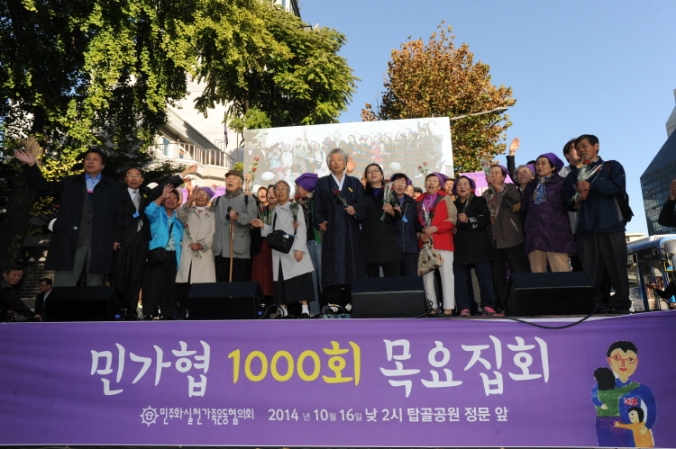
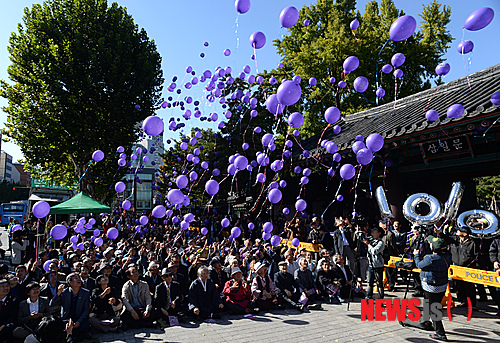
Recent comments